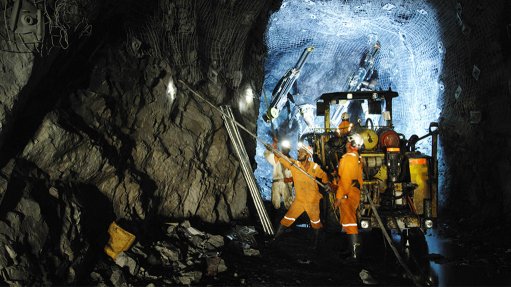
Name: Porgera mine.
Location: The Porgera mine is located at elevations between 2 200 m and 2 700 m above sea level in rugged mountainous terrain, in the Enga province of the western highlands of Papua New Guinea.
Controlling Company: The mine is owned by the Porgera Joint Venture (Porgera JV), comprising Barrick Gold (95%) and Mineral Resources Enga (5%).
Brief History: Alluvial gold showings were first officially reported in the area in 1938 by the Papua New Guinea government and, in 1948, the first geological investigations traced the source to the Waruwari Hill area. In 1964 and 1966, Bulolo Gold Dredging conducted mapping and channel sampling. Two years later, Mount Isa Mines (MIM) conducted shallow diamond drilling programmes, and mapping and channel sampling. More drilling was done in the area in 1969 by Anaconda Australia, which core-drilled six holes at Waruwari and one at Rambari. A small-scale sluicing operation was established in 1970 by MIM and Ada Explorations to exploit the alluvial gold showings; two adits were driven at Waruwari and one at Rambari. In 1979, a three-way JV agreement was established between Placer PNG, MIM and New Guinea Goldfields. A separate agreement, signed between the JV partners and the government of Papua New Guinea, granted the State the right to acquire, at cost, up to 10% of the project, if developed.
A preliminary technical and economic assessment, conducted in 1981 and based on a planned 15 000 t/d openpit mining operation was deemed uneconomical, but later exploration success prompted a re-evaluation. Another preliminary economic evaluation, conducted in 1984, returned positive results, based on a mining rate of 4 000 t/d. Development began in 1985, with the collaring of an exploration adit. A feasibility study in 1989, based on a production rate of 8 000 t/d from combined underground and openpit operations, returned positive results. After regulatory approval was received, full construction began immediately and the State accepted its full 10% entitlement in the project. Through various acquisitions, Placer Dome PNG, and later Barrick, established a 95% beneficial interest in the Porgera JV.
Commercial production was declared in 1990 and the openpit began operation in 1992, with a production rate of 8 000 t/d. In 1997, the underground mining operation was placed on care and maintenance, but restarted in 2002 after exploration successfully identified additional resources.
Brief Description: Porgera is a producing openpit and underground mine, which has a planned operating rate of about 5.2-million tonnes a year from the openpit and stockpiles of 800 000 t/y from underground. The mine produces gold in doré form from process plants using gravity and flotation, followed by autoclaves and cyanide leaching.
Geology/Mineralisation: The Porgera area geology consists of a complex sequence of high-level potassium-rich intrusives and variably altered sedimentary rocks. It has characteristics of different deposit types. Despite its alkalic nature, Porgera shares many similarities with porphyry copper deposits. Rapid emplacement at shallow crustal levels differentiates it from a typical gabbroic intrusion and the nature of the mineralisation is more indicative of an epithermal gold deposit.
Reserves: Total proven and probable reserves as at December 31, 2013, were 25.5-million tons grading 0.12 g/t of gold.
Resources: Total measured resources as at December 31, 2013, were 11.81-million tons grading 0.09 g/t of gold. Indicated resources were 28.53-million tons grading 0.076 g/t of gold. Inferred resources were 26.6-million tons grading 0.137 g/t of gold.
Products: Gold.
Mining Method: Openpit and underground.
Major Infrastructure and Equipment: Porgera comprises an openpit mine and associated waste dumps and haul roads, as well as an underground mine and mine development, with associated mining equipment and support equipment.
The mine hosts a six-million-ton-a-year capacity concentrator, with crushers, a grinding and flotation circuit, autoclaves, cyanide leaching and cyanide destruction for the recovery of gold, as well as a paste tailings backfill plant.
There are two camps for employees and a hard-surface airstrip located about 11 km from the mine.
Water is extracted from a reservoir containing more than seven- million cubic metres, located 7 km away, at the Waile Creek dam. In addition, there are four water treatment plants for potable water and five sewage treatment plants.
Power is supplied from the 62 MW gas-fired Hides power station through a 73 km transmission line and 13 MW of diesel-powered backup power from a generator located at the mine site.
Prospects: As part of Barrick’s portfolio optimisation plan, Porgera’s mine plan has been revised to focus on the higher-grade underground portion of the mine.
Contact Person: Investor relations.
Contact Details:
Barrick Gold Corporation,
tel +1 416 861 9911,
email investor@barrick.com, and
website http://www.barrick.com.